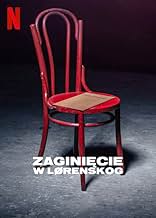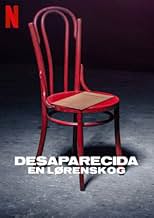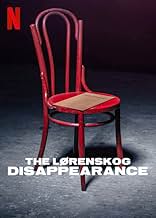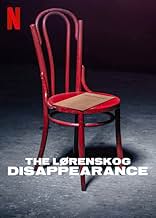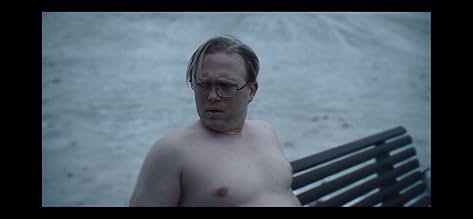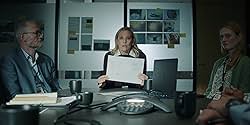La Disparue de Lørenskog
Original title: Forsvinningen - Lørenskog 31. oktober 2018
IMDb RATING
6.0/10
3.2K
YOUR RATING
When a billionaire's wife vanishes, Norwegian police must deal with the frenzied press and deceitful informants to find the truth. Based on real events.When a billionaire's wife vanishes, Norwegian police must deal with the frenzied press and deceitful informants to find the truth. Based on real events.When a billionaire's wife vanishes, Norwegian police must deal with the frenzied press and deceitful informants to find the truth. Based on real events.
Browse episodes
Featured reviews
A police procedural/investigative journalism series set in 2018 and following in Lørenskog, Norway. It's based on an actual case concerning a wealthy entrepreneur and the mysterious disappearance of his wife.
Each 50-minute episode looks at a different facet of the investigation, though the flow is chronological. Anne-Elisabeth Hagen is kidnapped at the beginning of the first episode. Her husband, Tom (Terje Strømdahl), is a wealthy billionaire. The kidnappers make ransom demands.
Jorunn Lakke (Yngvild Støen Grotmol) leads the police investigation along with her partner, Micael Delvir (Kidane Gjølme Dalva). Erlend Moe Riise (Christian Rubeck) is the lead journalist for the local paper; he appears to have informants within the police department that give him tips to influence the coverage. Aleks Zaretski (Victoria Ose) is another journalist who thinks the newspaper should pursue more theories.
The investigation stretches over two years as police and journalists encounter deadends, unconfirmed circumstantial evidence, questionable procedures, and unreliable sources. In addition, they encounter many potential villains, including Tom Hagen. Nevertheless, the story's final resolution is realistic.
This movie was fascinating to watch in the context of the "She said" film I recently watched that touted the necessity and doggedness of good investigative journalism. "The Lørenskog Disappearance" is more ambiguous, raising questions about the relationship between the press and the police and the possibility of tunnel vision hindering both investigations. I thought it was well done, though several storylines were left undeveloped, and a relatively large array of bad guys made following things difficult.
Each 50-minute episode looks at a different facet of the investigation, though the flow is chronological. Anne-Elisabeth Hagen is kidnapped at the beginning of the first episode. Her husband, Tom (Terje Strømdahl), is a wealthy billionaire. The kidnappers make ransom demands.
Jorunn Lakke (Yngvild Støen Grotmol) leads the police investigation along with her partner, Micael Delvir (Kidane Gjølme Dalva). Erlend Moe Riise (Christian Rubeck) is the lead journalist for the local paper; he appears to have informants within the police department that give him tips to influence the coverage. Aleks Zaretski (Victoria Ose) is another journalist who thinks the newspaper should pursue more theories.
The investigation stretches over two years as police and journalists encounter deadends, unconfirmed circumstantial evidence, questionable procedures, and unreliable sources. In addition, they encounter many potential villains, including Tom Hagen. Nevertheless, the story's final resolution is realistic.
This movie was fascinating to watch in the context of the "She said" film I recently watched that touted the necessity and doggedness of good investigative journalism. "The Lørenskog Disappearance" is more ambiguous, raising questions about the relationship between the press and the police and the possibility of tunnel vision hindering both investigations. I thought it was well done, though several storylines were left undeveloped, and a relatively large array of bad guys made following things difficult.
I stayed with this unusual mystery drama from Norway right to the end, but really rather wish I hadn't. It's claimed that the story was based on real-life events, but if that really was the case, then truth must indeed be stranger than fiction.
A middle-aged woman is forcibly kidnapped from her home while her billionaire husband is away. But no ransom note is immediately forthcoming and as home truths emerge about the state of the couple's marriage and in particular the elderly husband's extra-marital life, the mystery grows with every passing day, the latter documented by periodic datelines coming up on screen.
The two main cops assigned to the case are a woman and man team, she, a white woman, the dogged proceedural type, he, a younger black man, willing to think and work outside the box to try to crack the case, even if it means engaging with the criminal fraternity. The woman, as is commonplace in dramas like this, has family issues, in the form of her father who suffers from Alzheimer's Disease.
Also on the case is a determined crime reporter from a daily national newspaper who finally gets a break which takes him to Sweden, but unfortunately for him he's identified and gets badly beaten up for his trouble. It all goes down or so you're led to believe, to a climactic conclusion which at least from where I was sitting, seemed to leave the viewer high and dry.
Up until that point, it was just about okay as these Scandi-noir series go. With each episode coming at the story from a different angle, I found it too difficult to join the dots in the narrative which may have contributed to my disillusionment and dissatisfaction with the ending.
I appreciate that the original and unusual prismatic format adopted here may have been an attempt to freshen up the genre, but for me, it just felt like I was led up the path and in the end left absolutely nowhere by an over-enigmatic ending.
A middle-aged woman is forcibly kidnapped from her home while her billionaire husband is away. But no ransom note is immediately forthcoming and as home truths emerge about the state of the couple's marriage and in particular the elderly husband's extra-marital life, the mystery grows with every passing day, the latter documented by periodic datelines coming up on screen.
The two main cops assigned to the case are a woman and man team, she, a white woman, the dogged proceedural type, he, a younger black man, willing to think and work outside the box to try to crack the case, even if it means engaging with the criminal fraternity. The woman, as is commonplace in dramas like this, has family issues, in the form of her father who suffers from Alzheimer's Disease.
Also on the case is a determined crime reporter from a daily national newspaper who finally gets a break which takes him to Sweden, but unfortunately for him he's identified and gets badly beaten up for his trouble. It all goes down or so you're led to believe, to a climactic conclusion which at least from where I was sitting, seemed to leave the viewer high and dry.
Up until that point, it was just about okay as these Scandi-noir series go. With each episode coming at the story from a different angle, I found it too difficult to join the dots in the narrative which may have contributed to my disillusionment and dissatisfaction with the ending.
I appreciate that the original and unusual prismatic format adopted here may have been an attempt to freshen up the genre, but for me, it just felt like I was led up the path and in the end left absolutely nowhere by an over-enigmatic ending.
Fascinating, detailed, intriguing examination of a real-life missing person case. Each episode follows one of the parties involved, ie the police, the journalists, the lawyers, and the story emerges from this fractured looking glass. All good and original and engaging so far. However, when it comes to the 5th and final episode, this series simply just pulls up the drawbridge on the story and gives nothing to the viewer by way of theory, explanation, new perspective. OK it's a 'true' story, more or less, and as such the jury is still out and no one has been convicted. But ending the series with little more than a shrug just confirms this as s a TV experience this is just a distraction for a few hours and with nothing to contribute to the subject it asks us to consider. To be avoided.
This series frustrated me, although I watched it until the end. I found it extremely difficult to follow. But I wanted to know what was going to happen, since after all, this is based on a true story. With none of the characters I could sympathise, since they are all distant and dark. Moreover, and worst of all, I lost the thread of the story. At a certain point I did not even know anymore if I had seen already several characters that were shown. This is really a pity because the story in itself seems intriguing; the media parroting the police and one police officer even feeding deliberately the media with information. The female journalist that was courageous and probably right, hence different from her colleagues, lost her job and we did not see her anymore. There is absolutely nothing beautiful or interesting in the way this has been filmed, neither in the dialogues, nor in the scenery and definitely not in the way the story is told. The Danish series "The Investigation", on the contrary, tells in a magnificent way also a horrible true story and the actors are all fabulous.
8rbod
I don't know how this could be made unless it is explicitly sanctioned by both the authority that investigates and charges crime AND the people that make up the persons of interest. I can't imagine why anyone would agree to it.
Not what I would call a documentary.
Anyway, aside from that I did enjoy it as an entertainment, which I think is problematic as a "true" story.
Now my problem with the presentation in one crucial aspect of "evidence" as presented. The language as we know is Norwegian. I watched it dubbed in English with English captions. As is often the case, the spoken dialogue does not match the captions. Normally this is not a problem, but: Tom Hagen is about 70 and has been married for 49 years to his disappeared wife.
The film has the prenuptial agreement signed in 1993 I believe, which would have put their wedding at around 1973.
1993 is 29 years ago, not 49. Giving more weight to this observation, the dialogue says prenup, the caption says marital agreement. Ordinarily one would not make a fuss over this language discrepancy, except, you cannot have a prenuptial agreement when you've already been married for 20 years.
So, this was not a prenup but an agreement made after 20 years of marriage. It casts an entirely different light on the story, because although it was clear an error was made, what the error was was not clear. Was the year of the agreement 1973 and therefore a prenup (no, I don't think so) or was it not a prenup but a marital agreement made after 20 years of marriage (yes, I think) Although I figured it out I was not 100 percent sure and thought about it the whole time I was watching which was a distraction I could have done without.
It is not evidence of a crime, however, but changes the idea of motive.
If one were not paying close attention to do the math, and not having captions on they saw a different film from me.
I am very disappointed.
Not what I would call a documentary.
Anyway, aside from that I did enjoy it as an entertainment, which I think is problematic as a "true" story.
Now my problem with the presentation in one crucial aspect of "evidence" as presented. The language as we know is Norwegian. I watched it dubbed in English with English captions. As is often the case, the spoken dialogue does not match the captions. Normally this is not a problem, but: Tom Hagen is about 70 and has been married for 49 years to his disappeared wife.
The film has the prenuptial agreement signed in 1993 I believe, which would have put their wedding at around 1973.
1993 is 29 years ago, not 49. Giving more weight to this observation, the dialogue says prenup, the caption says marital agreement. Ordinarily one would not make a fuss over this language discrepancy, except, you cannot have a prenuptial agreement when you've already been married for 20 years.
So, this was not a prenup but an agreement made after 20 years of marriage. It casts an entirely different light on the story, because although it was clear an error was made, what the error was was not clear. Was the year of the agreement 1973 and therefore a prenup (no, I don't think so) or was it not a prenup but a marital agreement made after 20 years of marriage (yes, I think) Although I figured it out I was not 100 percent sure and thought about it the whole time I was watching which was a distraction I could have done without.
It is not evidence of a crime, however, but changes the idea of motive.
If one were not paying close attention to do the math, and not having captions on they saw a different film from me.
I am very disappointed.
Did you know
- TriviaAll entries contain spoilers
- How many seasons does The Lørenskog Disappearance have?Powered by Alexa
Details
- Release date
- Country of origin
- Official site
- Language
- Also known as
- The Lørenskog Disappearance
- Production company
- See more company credits at IMDbPro
- Runtime52 minutes
- Color
- Sound mix
Contribute to this page
Suggest an edit or add missing content

